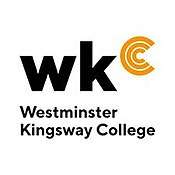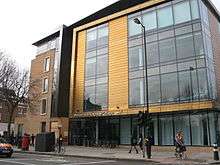Westminster Kingsway College
Westminster Kingsway College is a further education college in central London with centres in Kings Cross, London and Regent's Park in Camden, together with Victoria (1910) and Soho centres in Westminster.[1] The college has around 14,000 students across all age ranges and provides further, adult and higher education programmes including full-time and part-time vocational, professional and academic courses at different levels.[1] An international department has students from overseas including those who attend study visits, exchanges and internships from partner colleges overseas.
| Westminster Kingsway College | |
|---|---|
 | |
| Address | |
Regent's Park Centre, Longford Street Camden , London , NW1 3HB United Kingdom | |
| Information | |
| Type | Further Education College |
| Motto | It All Begins At WestKing |
| Established | 1910 |
| Department for Education URN | 130421 Tables |
| Ofsted | Reports |
| Principal | Kim Caplin |
| Staff | 500-1000 |
| Gender | mixed |
| Age | 16 to 99 |
| Website | https://www.westking.ac.uk |
Capital City College Group
On 1 August 2016, Westminster Kingsway College merged with City and Islington College to form the WKCIC Group, trading as Capital City College Group [2](CCCG). On 1 November 2017, the College of Haringey, Enfield and North East London joined CCCG, making the Group the largest further education and training provider in London[3] and one of the largest in the UK.
Assisted Learning Support
One of the college's most notable features is the assisted learning support or (ALS). This department has around 25 staff members who contribute to one of the most progressive and comprehensive learning support departments in central London. The learner support offered can range from a hand in study skills for people who are re-entering education, to care and guidance for students with (ASD) and other learning disabilities.
History

The college was founded in September 2000 following the merger of Westminster and Kingsway Colleges. The Victoria centre, where the School of Hospitality first opened its doors to learners in 1910, celebrated its centenary in 2010. Based in Vincent Square, the centre houses the college's own restaurant, The Vincent Rooms, with cuisine prepared and served by second and third year professional chef students.
The college provides community education, with a programme of neighbourhood learning in partnership with Camden Council and in Westminster with local organisations.
The college's specialist subjects have been given to vocational training including Hospitality, Creative Media, Performing Arts, Business and Public Administration. It also provides higher education for about 250 full-time equivalent students on foundation degrees in Business, Hospitality Management, Culinary Arts, Travel & Tourism, Accounting and Public Administration.
Westminster College began as a School of Hospitality in Vincent Square in 1910 when in 1908 a consultative committee which included Sir Isidore Salmon, Auguste Escoffier and Cesar Ritz was established to design training programmes in professional cookery in readiness to produce graduates that could work in London's finest hotels. The first course to be developed was the Cookery Technical Day School, which was soon to be formulated into the Professional Chef Diploma. Within a couple of years, the school had added food service to its course portfolio and a training restaurant was opened. Records show that this was in fact the UK's first Hospitality School established in 1910.
The school developed during the interwar years as additional kitchens, cold rooms and larder and pastry areas were added. A two-year hotel manager's course replaced the food service course. There were plans for a 50-bedroom 'training hotel', which had begun construction in 1939. This unfortunately was stopped as a result of the outbreak of war and was never completed.
Following the Second World War, the Vincent Rooms restaurant was extended, and in 1953 the Escoffier Restaurant was opened. Further kitchens were added as well as a wine cellar. The restaurants have evolved over a considerable period of time alongside the School of Hospitality and Culinary Arts at Westminster Kingsway College producing graduates who are now working in hotels and restaurants all over the world. In 1985 there was a substantial and comprehensive refit of the whole school.
Before the merger, Kingsway College, previously known as Princeton College, was a large college in Camden. It received £55million for redevelopment in 2009. Notable Principals included Fred Flower from 1960 to 1978. Regarded as one of the great humanist educators of his day, under Flower's leadership, Kingsway became one of the country's most diverse and thriving further education colleges, and his skill provided a framework for the development of unconventional ideas which came to powerfully influence British post-16 education. Flower sat on both the Newsom (1963) and the Taylor (1977) committees.[4]
External assessment
QAA
The Quality Assurance Agency for Higher Education independently assessed the college in 2010.[5] It concluded that: " ... the ... review team ... considers that there can be confidence in the college’s management of its responsibilities, as set out in its partnership agreements, for the standards of the awards it offers on behalf of its awarding bodies. ... also considers that there can be confidence in the college’s management of its responsibilities, as set out in its partnership agreements, for the quality of learning opportunities it offers. ... reliance can be placed on the accuracy and completeness of the information that the college is responsible for publishing about itself and the programmes it delivers."[6]
Notable alumni
- Little Simz - Rapper, Singer & Actress
- Michelle Collins – Actress
- Kathy Burke – Comedian
- Eliza Doolittle – Singer/Songwriter
- Ainsley Harriott – Celebrity chef
- Leon Lai – Actor & Singer
- Steve McFadden – Actor
- Toby Mott – Artist
- Trevor Nelson – BBC Radio DJ
- Jamie Oliver – Celebrity chef
- Nathaniel Peat - Entrepreneur, Reality TV winner
- Gillian Taylforth - Actress
- Sid Vicious – Sex Pistols Bassist
- Jah Wobble – Bassist
- Antony Worrall Thompson – Celebrity chef
- Sophie Wright – Celebrity chef
Footnotes
- Westminster Kingsway College: The Independent, 10 August 2010 Accessed 24 March 2011
- https://www.westking.ac.uk/news/new-name-westminster-kingsway-city-islington-college-group/
- https://capitalccg.ac.uk/news/
- Booth, Dick. Obituary for Fred Flower, The Guardian, 13 August 2001 Accessed 24 June 2012
- Assessment by the Quality Assurance Agency for Higher Education, 2010, accessed 25 June 2012
- Quality Assurance Agency for Higher Education (April 2010). "Integrated quality and enhancement review" (PDF). Archived from the original (PDF) on 24 July 2015. Retrieved 7 August 2015.
References
External links
| Wikimedia Commons has media related to Westminster Kingsway College. |
- Official Westminster Kingsway College website, Accessed 3 January 2011